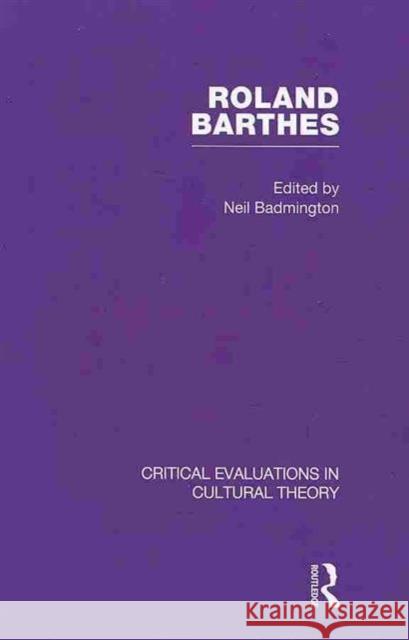Roland Barthes » książka
Roland Barthes
ISBN-13: 9780415472579 / Angielski / Twarda / 2010 / 1324 str.
Thirty years ago the English-speaking world was discovering the work of some of the key poststructuralist theorists for the first time: Jacques Derrida's Of Grammatology had just appeared in translation, as had Roland Barthes' S/Z, Jacques Lacan's Ecrits, Gilles Deleuze and Felix Guattari's Anti-Oedipus, Michel Foucault's Discipline and Punish, and Pierre Macherey's A Theory of Literary Production. English editions of Julia Kristeva's Desire in Language and Jean-Francois Lyotard's The Postmodern Condition were just around the corner. The subsequent 'theory wars' that raged on campuses in the 1980s are now generally seen as a thing of the past: poststructuralism is now, largely, a familiar and widely taught part of the academic landscape in the English-speaking world. Of all the poststructuralists, Roland Barthes (1915-80) is probably the most widely read. Mythologies has sold hundreds of thousands of copies in paperback and has never been out of print since it first appeared in English in 1972. And 'The Death of the Author', his short essay dating from 1968, is probably the most widely anthologized theoretical text of all. Moreover, even though he died over a quarter of a century ago, Barthes remains especially 'alive' to English-speaking audiences in that his voluminous writings are still being translated into English. Reflecting the vibrancy and dynamism of Barthes Studies, this four-volume collection, a new title in Routledge's Critical Evaluations in Cultural Theory series, brings together the best and most influential cutting-edge and canonical research on Roland Barthes. The gathered materials address the full range of Barthes' extremely diverse output to provide the definitive evaluation of his work. With a full index, together with a comprehensive introduction, newly written by the editor, which places the collected material in its historical and intellectual context, Roland Barthes is an essential work of reference. It is destined to be valued by scholars, students, and researchers as a vital research resource.
Thirty years ago the English-speaking world was discovering the work of some of the key poststructuralist theorists for the first time: Jacques Derrida’s Of Grammatology had just appeared in translation, as had Roland Barthes’ S/Z, Jacques Lacan’s Écrits, Gilles Deleuze and Félix Guattari’s Anti-Oedipus, Michel Foucault’s Discipline and Punish, and Pierre Macherey’s A Theory of Literary Production. English editions of Julia Kristeva’s Desire in Language and Jean-François Lyotard’s The Postmodern Condition were just around the corner.
The subsequent ‘theory wars’ that raged on campuses in the 1980s are now generally seen as a thing of the past: poststructuralism is now, largely, a familiar and widely taught part of the academic landscape in the English-speaking world.
Of all the poststructuralists, Roland Barthes (1915–80) is probably the most widely read. Mythologies has sold hundreds of thousands of copies in paperback and has never been out of print since it first appeared in English in 1972. And ‘The Death of the Author’, his short essay dating from 1968, is probably the most widely anthologized theoretical text of all. Moreover, even though he died over a quarter of a century ago, Barthes remains especially ‘alive’ to English-speaking audiences in that his voluminous writings are still being translated into English.
Reflecting the vibrancy and dynamism of Barthes Studies, this four-volume collection, a new title in Routledge’s Critical Evaluations in Cultural Theory series, brings together the best and most influential cutting-edge and canonical research on Roland Barthes. The gathered materials address the full range of Barthes’ extremely diverse output to provide the definitive evaluation of his work.
With a full index, together with a comprehensive introduction, newly written by the editor, which places the collected material in its historical and intellectual context, Roland Barthes is an essential work of reference. It is destined to be valued by scholars, students, and researchers as a vital research resource.











